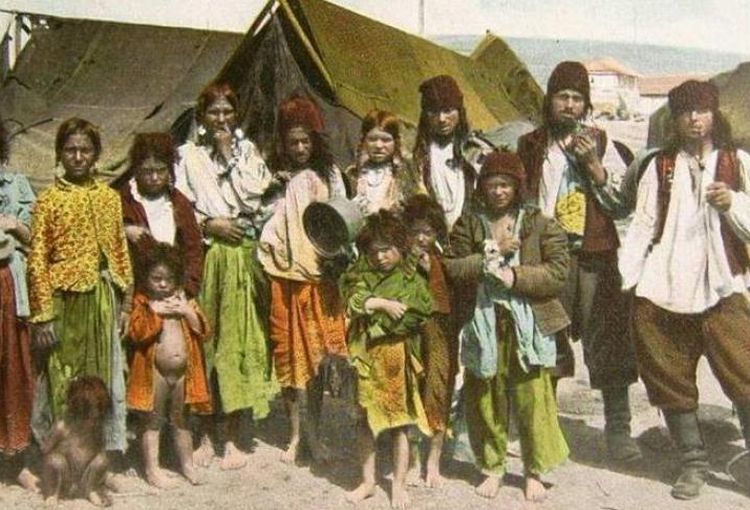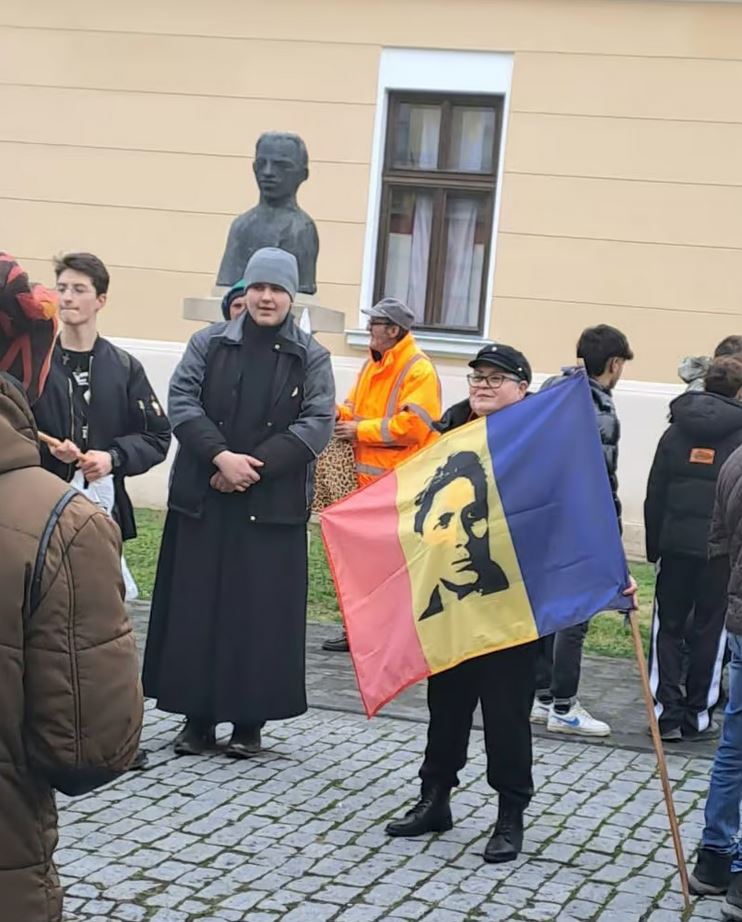Sterie Ciumetti
Incorect Politic
Martie 24, 2019
Articol din seria Remember, apărut inițial pe site-ul tracologia, scris fără diacritice:
Tiganii … astazi
Cine sunt tiganii? De unde au venit? Ce vor ei? Cu ce se ocupa? Puteti gasi mii de carti in orice biblioteca care sa trateze aceasta problema a tiganilor. Domnul Paul Everac a scris o carte foarte interesanta despre acest subiect si va recomand sa o cititi.
Pe mine nu ma intereseaza cine este acest popor hulit. Pe mine ma intereseaza ca acesti asa zisi “Romani” sa nu mai fie parazitii poporului Roman. Eu unul nu-i doresc langa mine in bloc, nu-i doresc langa mine in bar, nu vreau sa-i dau o tigara cand ma acosteaza cu vesnicul “Frate”, nu vreau sa-i strang mana cand mi-o intinde.
Ne-am saturat pana peste cap sa vedem tigani burtosi in ultimele tipuri de masini straine, cu lanturi de aur la gat, vorbind cu nonsalanta la telefonul mobil, pe degetele butucanoaste si nemuncite se lafaie inele groase de aur in timp ce Romanii de rand se zbat intr-o crunta saracie.
Ne-am saturat sa vedem batrane cersind in fata bisericii in vreme ce tiganii ne dau cu tifla si arunca in cutie maruntul ca unui caine hamesit. Vreau ca in Romania sa conduca Romanii si nu alde Madalin Voicu. Acest “om” este o scuza jalnica, este un exemplar decazut in ultimul hal. El se considera salvatorul si la nevoie martirul poporului sau. Mie unul mi se face sila cand il vad.
Poporul Roman este unul dintre cele mai tolerante popoare de pe planeta. Am tolerat aici, alaturi de noi unguri, tigani, germani, armeni, rusi lipoveni, ucrainieni, sarbi, bulgari, toate rasele si toate tipurile de oameni. Insa niciunii nu s-au comportat asa de urat cu noi cum o fac tiganii.

S-a ajuns astfel intr-o situatie critica in Romania, in orasele mari in special, ca Romanilor sa le fie frica sa iasa pe strada noaptea pentru ca se tem.
Vi se pare normal sa ne temem in tara noastra ?
Mie unul nu mi se pare deloc normal. Si atunci, cand Romanii se hotarasc sa ia legea in propriile maini, suntem priviti ca niste criminali. Pentru ce domnilor? Pentru ca ne aparam rudele, parintii, prietenii? Pentru ca avem curajul sa le tinem piept acestor barbari?
Cati dintre dumneavoastra au avut macar un conflict cu aceasta etnie? Din cunoscutii mei, cel putin 80% au avut probleme medii iar cam 20% au avut probleme majore, de genul a fi batuti sau chiar injunghiati de catre tigani. Pentru aceasta noi cerem sange pentru sange. CEREM sa fie luate masuri imediate impotriva celor care aduc atingere drepturilor unui cetatean Roman.
Multi dintre noi se complac intr-o stanjenitoare nepasare. Ce e mai simplu decat sa spui “Nu mi se va intampla mie!”. Dar ce veti face in momentul in care vi se va intampla chiar dumneavoastra?
Ce veti face atunci cand prietena sau sotia dumneavoastra va fi violata de catre un tigan? Ce veti face atunci cand bunicii sau parintii dumneavoastra vor fi omorati in propria lor casa pentru cateva sute de mii mizerabile? Ce veti face atunci cand in autobuz, un tigan va va baga mana in buzunar si va va “suti” portofelul?

Probabil ca atunci imi veti da dreptate, insa deja va fi prea tarziu. Noi dorim sa preintampinam aceste situatii printr-o mai buna mediatizare a asa zisei “etnii”. Acesti tigani sunt un popor nomad, parazitar, care nu au puterea fizica de a munci.
Ei se considera superiori numai atunci cand sunt intr-un numar mai mare decat victimele lor, ceea ce demonstreaza completa lipsa a oricaror sentimente umane, sunt precum lupii care navalesc asupra unui cerb ranit.
Daca tot Romanii sunt considerati ca nedreptatesc tiganii, macar sa le dam un motiv serios sa se considere nedreptatiti. Haideti sa luam masuri impotriva lor. Haideti sa nu le mai permitem accesul in mijloacele de transport in comun. Haideti sa nu-i mai angajam in firmele noastre; sa nu le mai dam de pomana. Sa nu le mai dam posibilitatea sa ne umileasca cand ne intoarcem de la servici, cu cuvintele lor de duh. Sa incercam sa facem ceva, pentru ca Romanilor sa nu le mai fie frica de acesti tigani.
Probabil ca voi fi considerat extremist pentru ceea ce am scris in acest articol. Eu unul nu voi accepta niciodata mana intinsa de catre un tigan. Niciodata nu va fi egalul meu, si voi cauta sa-i cobor de pe piedestalul unde au fost ridicati de dusmanii Romanilor, ca si cum ar fi niste nedreptatiti. Dar nimeni nu mai vorbeste de faptul ca peste 70% din puscariasi sunt de etnie tiganeasca.
Pe nimeni nu intereseaza ca sunt un focar de mizerie, de boli, de proasta crestere, de intoleranta. Nu ! Tot Romanii sunt cei care-i nedreptatesc pe tigani. Sper sa apuc ziua in care se va face dreptate/
Pentru ca Romania este a Romanilor.
 Incorect Politic O Publicație Dizidentă
Incorect Politic O Publicație Dizidentă




Ţiganii, ca şi jidanii sunt neamuri parazite.
Aceste grupuri etnice, puţine la număr, au trăsături comune cu paraziţii biologici – cu viruşii de pildă.
Se remarcă uşor trăsături comune:
1. Un neam parazit nu poate trăi separat de poporul gazdă, de poporul parazitat, din care îşi extrage hrana, bunăstarea. Israelul nu este o excepţie. Dacă mafia jidovească internaţională şi-ar pierde influenţa, statul artificial numit Israel ar imploda în timp record. Ventuzele prin care îşi extrage veniturile ar cădea.
2. Un neam parazit acţionează numai în grup, cu puternice legături de tip tribal, formând o reţea de crimă organizată cu ramificaţii adesea invizibile poporului parazitat.
3. Acţiunile unui neam parazit sunt întotdeauna dăunătoare poporului gazdă, iar în final fatale. Dacă privim în trecut, jidanii au distrus civilizaţie după civilizaţie şi sunt acum pe cale să desăvârşească distrugerea civilizaţiei europene.
4. Membrii unui grup etnic parazit exclud munca ca mijloc de existenţă cinstită, dezvoltând numai unelte de jaf şi control.
5. Parazitul depinde de alcineva pentru a exista, fără a returna nimic folositor sau adecvat. Studiul istoriei arată că neamul parazitar nu înapoiază niciodată nimic şi nu manifestă nici o urmă de gratitudine pentru a i se fi permis să se hrănească din gazdă. Motto-ul paraziţilor este “Întotdeauna ia”.
6. Obţinerea controlului asupra gazdei îi este necesar parazitului deoarece acesta este perceput ca nociv într-o societate morală, sănătoasă. Astfel se explică efortul de grup al paraziţilor de a submina tot ceea ce este sănătos într-o societate.
7. Neamurile parazite urăsc întotdeauna poporul pe care-l parazitează. Ura menţine coeziunea în cadrul grupului şi legitimează, justifică crimele.
Cum se explică succesul incomparabil mai mare al jidovimii internaţionale faţă de ţiganul internaţional?
În primul rând, jidanii au câteva milenii de evoluţie în plus.
În al doilea rând, diferenţa de IQ. Ţiganii, au un coeficient mediu de inteligenţă net inferior jidanilor şi al popoarelor din care se hranesc.
Trebuie să înţelegem că putem vorbi despre VINOVĂŢIE COLECTIVĂ în cazul grupurilor etnice parazite.
Atenţie, despre vinovăţie colectivă se poate vorbi NUMAI în cazul neamurilor parazite!
Legăturile puternice intra-grup care se menţin pentru acţiune organizată, coerentă, de subminare şi distrugere a poporului gazdă, le permit paraziţilor să acţioneze ca un singur organism malefic. Malefic şi puternic.
Toţi jidanii sunt implicaţi în acţiunile toxice ale grupului într-un fel sau altul şi acelaşi lucru se poate spune despre ţigani.
Asta îi face vinovaţi pe toţi. Fără excepţie.
SE CENZUREAZA DOCUMENTARELE CINSTITE SI OBIECTIVE DESPRE TIGANI INCLUSIV BBC-UL LE CENZUREAZA – mai recent pe Chachipe – la finalul comentariului aveti articolul
Acesta este un comentariu al meu mai vechi – il repet aici .
in sprijinul postarii Doamnei Angela Tocila, va recomand filmul reporterului BBC John Sweeney, caruia BBC-ul a refuzat sa-i ramburseze banii, intrucat filmul este prea bun.
Deci l-a facut din fonduri proprii.
Se pare ca nu poate fi vizualizat integral decat in Marea Britanie desi eu l-am vazut integral transmis la tv de BBC.
Este un film remarcabil despre modul in care tiganii refuza sa-si scolarizeze copii, trimitandu-i de ff mici la cersit peste 10 ore pe zi.
Dar cel mai zguduitor element al lui este declaratia finala a Bulibashei x catre acest reporter, conform careia, tiganii nu vor si n-au de gand sub nici-o forma sa renunte la acest mod de viata “intrucat asa si-au trait viata de doua mii de ani si asa o vor trai si in continuare”
Citez din amintire, dar am fost extrem de fericita sa gasesc acest documentar de cca o ora ca sa vi-l citez intrucat este unic prin abordarea cinstita, azi( in sufocarea lui political correctness), facut de acest evreu bine intentionat si cinstit(spre deosebire de atatia propagandisti din universitati si medii, care sunt opusul lui), documentar cu care el a incercat sa indrepte apucaturile tiganilor fata de copiii lor cei chinuiti.
BBC-ul a refuzat sa-l mai plateasca, printre altele, intrucat acest unic documentar il citeaza pe bulibasa care refuza sa devina mai uman cu proprii lui copii, si deoarece documentarul demasca ff detaliat si fara perdea modul lor parazitar si crud, de a-si duce zilele.
O familie facea doar din incasarile sociale pe spinarea englezilor 13000£ pe luna (cu resedinte inregistrate acolo drept stabile desi sedeau doar pe scurta durata si n-aveau dreptul la asa incasari)
Child beggars as young as four making £100,000 a year each for …
http://www.dailymail.co.uk/…/Child-beggars-young-making-100-000-year...
21 Oct 2011 – BBC investigators filmed tiny Romanian girl scavenging for food in … Exploited: Reporter John Sweeney goes to Romania to confront a gypsy …
In clipa asta am descoperit inca un reporter al carui documentar a fost respins de BBC – Chachipe precum si documentarul cineastului roman Liviu Tipurita, amandoi stampilati in rasisti pe baza a : BBC’s editorial guidelines:
http://romarights.wordpress.com/anti-gypsyis/
link:
https://www.dailymail.co.uk/news/article-2051482/Child-beggars-young-making-100-000-year-gypsy-gangs.html
titlul filmului cu fotografii din filmul cu finalul taiat caci bulibasa marturisea in finalul acestui film ca ei au cersit de doua mii de ani, asa au trait de atunci incoace , din cersit, si ca n-au de gand sa se schimbe acum !
titlul filmului:
The modern-day Oliver Twists: Child beggars as young as FOUR making £100,000 a year each for gypsy gangs
Chachipe
Rights & Justice
Home About us Anti-Gypsyism Kosovo Activities Luxembourg Serbia Visa liberalisation vs. asylum Roma Human Rights Refugee protection Mitrovica Lead Crisis At risk/Kosovo Roma facing deportation Subscribe to feed
Anti-Gypsyism
“For the best or for the worst”
Chachipe presentation at the + RESPECT seminar on “Combating anti-Roma stereotypes and prejudices through mass media”, Regione Puglia Offices, Brussels, 4 May 2011
“Strong piece of journalism about a very difficult subject” – BBC rejects Chachipe’s complaint against “Gypsy child thieves” as unfounded
8 October 2010 – The Editorial Standards Committee of the BBC has just made public its decision, where it rejected Chachipe’s appeal against the decision of the BBC Editorial Complaint Unit (ECU), which found that Chachipe’s criticism of “Gypsy child thieves” was unfounded. With this decision, Chachipe’s complaint has failed the final stage of the BBC’s internal complaint procedure, which is based on the BBC’s editorial guidelines.
Of all the points, Chachipe raised in its complaints (which are available on Chachipe’s website), the Editorial Standards Committee retained to only one: Chachipe’s criticism regarding the usage of the word “Gypsy”. However, the Committee did not see any problem in the usage of the word “Gypsy crime”, since it shared the view of the producers of the documentary, who maintained that there is indeed a certain type of crime, which can be attributed to Roma. The Committee said: “The Committee did not consider the phrase suggested that all Roma were criminals, nor that in the context of the expectations of a UK audience, did it have the Fascist connotations ascribed to it by the complainants and by Amnesty International.”
The Committee also took the view “that there was a clear public interest in investigating the increase in child crime amongst the Roma community”. It did not accept Chachipe’s right to complain over a violation of privacy rights in the context of secret filming, since it considered that Chachipe is not a first party in relation to the documentary. On the same grounds, it rejected Chachipe’s argument according to which the documentary should be assessed against the fairness and consent guideline of the BBC editorial code.
At the end, the Committee supported the view of the ECU complaints manager, who said: “I appreciate (the programme) raised some controversial and sensitive issues and showed the Roma community in a frequently negative light, but I believe the allegations in the programme were supported by facts and there was a clear editorial purpose in reporting serious and widespread criminal behaviour.”
Chachipe is utterly disappointed by this decision, which it does not perceive as fair and unbiased. Over a year, the organisation has been fighting an uphill fight against the BBC documentary, which it sees as perpetrating racist stereotypes about Roma. One of the arguments of the documentary was to link begging and thieving to Roma culture and to blame Roma for the strengthening of anti-Gypsyism.
“Gypsy child thieves” was distributed in more than twenty countries including Australia and Japan. In Switzerland, the documentary was recently broadcasted under the title: “Im Auftrag der Sippe: Wie Romakinder zu Dieben werden” (On the order of the clan: How Roma children become thieves”).
Chachipe said that the rejection of its complaint by the Editorial Standards Committee was based on a most generous interpretation of the BBC’s editorial guidelines, to the advantage of the producers. The organisation criticised the fact that evidence suggesting the biased character of the investigations leading to the documentary, including the fact, that no major Roma organisation was consulted regarding its content, was not considered.
Chachipe also pointed out that the legitimacy of its complaint was testified by supporting statements from Amnesty International and of the Council of Europe Roma Division, which were also rejected.
“The BBC’s final rejection of our complaint shows how difficult it still is to combat anti-Roma racism,” the organisation said. “If those who there to make an objective assessment of the validity of a complaint are themselves caught in a bias, it is indeed very difficult to convince them of the racist nature of a statement,” the organisation concluded.
“Gypsy child thieves” or the mainstreaming of anti-Gypsyism
On 2 September 2009, the BBC broadcasted, in its second programme, the TV documentary Gypsy child thieves by the Romanian film maker Liviu Tipurita.
Under the pretence of reporting about the trafficking and exploitation of Romanian Roma children by organised crime, this documentary spreads the worst anti-Gypsy stereotypes. It includes statements such as those:
“Many [Gypsies] have resorted to begging and stealing to survive.”
“Many Romani Gypsies marry of their children at a very early age. The girls are in effect sold into marriage.”
“Only this tough approach can break the cycle of child exploitation common in the Romanian Gypsy culture.”
“Largely excluded from society, many Romanian Gypsies have resorted to criminality.”
“I’ve seen anti-Gypsy feeling getting stronger not only in Romanian but across Europe. I’ve also seen Gypsy petty crime turn into serious crime, into international organised crime.”
“My fear is that without immediate help the Gypsy child thieves that I’ve encountered in my journey will grow up into hardened criminals and the cycle of abuse and exploitation will spiral out of control.”
The documentary mixes begging and stealing and associates both to the activities of human traffickers. It also pretends that begging and stealing are rooted in Romany culture and refers to them as “Gypsy crime”. On this basis, it questions the possibility of integrating Roma into society.
Chachipe has filed two complaints with the BBC (complaint to the Complaint Unit, complaint to the Editorial Board 1 and 2) which were both rejected (see rejection by the Complaint Unit and rejection by the Editorial Complaint Unit), the BBC basically arguing that crime is widespread within the Romanian Roma community and that it was its duty to report on it.
“I appreciate that it [the programme] raised some controversial and sensitive issues and showed the Roma community in a frequently negative light, but I believe the allegations in the programme were supported by facts and there was a clear editorial purpose in reporting serious and widespread criminal behaviour.” (Colin Tregear, Head of the Editorial Complaint Unit, in his reply to Chachipe).
Not only did the BBC fail to apologize to the Roma as it was requested by Chachipe. Moreover, has the documentary be rebroadcasted on 20 and 21 February 2010 and exported to other countries.
In Switzerland, where the documentary was broadcasted by public TV under the most telling title, “Dresssés pour voler: La malédication des enfants gitans” (translated: Trained to steal: The curse of the Gypsy children), the discussion forum of the TV station had to be closed as “[t]he debate drifted away from the proposed topic” as the editor put it.
In Belgium, the Centre for Equal Opportunities had to call on RTL TVI, which broadcasted the documentary, to remove from its site “outrageous statements” which followed the broadcasting of the documentary.
The obviously racist character of this documentary has not kept the Foreign Press Association, an organisation of media professionals in the UK working for foreign media and who sees its vocation in that it “encourages the highest standards of professional integrity and skill, helps to nurture the next generation of journalists, contributes to the freedom and independence of journalists and the media throughout the world, and continually strives to enhance communication and understanding between the rich diversity of cultures of this World and the global community” (emphasise added) to grant its 2009 Media Award for the TV Feature Story of the Year to “Gypsy child thieves” which the judges “consider an example of truly excellent TV story- telling, brilliant camera work & fabulous visuals resulting in a film that unfolds and develops beautifully to shine a powerful light on a gripping story.”
The Royal Television Society has found it “A fantastic achievement. A powerful eye-witness account and an outstanding example of story-telling” for which it was granted it was granted the international current affairs award.
Chachipe has asked the Foreign Press Association to recall its media award. It has also filed a complaint against the Belgian TV channels, RTL TVI and VRT, which broadcasted this documentary and is considering further actions.
In the meantime, Chachipe has received the support from numerous Roma NGOs and individuals including Mesemrom, the UKAGW, Union Romani and Professor Ian Hancock. Amnesty International highlighted its position on the use of the word “Gypsy” and expressed concerns over the persistent use of the term “Gypsy crime” throughout the film.
The Council of Europe has written to the Director of the Editorial Complaint Unit in order to highlight its concerns about this film. In its statement, the Council of Europe says: “While initially aimed at addressing a serious issue, it [the documentary] ends up fueling the growing anti-Gypsyism in Europe and generalising trafficking to the whole Roma community and Roma parents in particular.”
In his keynote address to the Conference on EU projects in favour of the Roma community, Professor Ian Hancock said about this documentary:
“No understanding of the situation of those children came from the documentary, and in no way did it present our “rich culture.” Instead it helped hammer down even more firmly the growing Romaphobia in Britain, the country where I was born, ensuring further hateful newspaper headlines.”
These numerous positive reactions have encouraged Chachipe to file an third complaint with the BBC Trust which it hopes will finally be assessed in a fair and objective way.
“Blue Gypsy”: Reactions on a film
On 21 May 2009, the short movie “Blue Gypsy” by the Yugoslav filmmaker Emir Kusturica entered the French cinemas as part of a common production supported by UNICEF, the World Food Programm, and the Italian Development Cooperation. The film tells the story of a young Roma boy, who is just released from juvenile detention to be forced again by his parents into stealing.
Chachipe initiated a protest against this film which it sees as contributing to foster stereotypes against Roma.
In its reply, UNICEF acknowledged Chachipe’s concerns about the film, which were supported by Roma NGOs from around Europe, and promised to consider the suggestion of organising public discussions with Roma NGOs, whenever the film is broadcasted.
If the above link does not work, please try via Youtube, directly: http://www.youtube.com/watch?v=HdNnknTE2OM
”It was about a group of people and children, gypsies, who were arrested at the Yugoslav-Italian border. …
They had crossed the border illegally for the umpteenth time in order to beg, steal and even sell the children. First, it upset me emotionally, and then I realized it could be my next film. (…)”
Emir Kusturica about a newspaper article which gave him the idea for “Time of the Gypsies”. ”It was about a group of people and children, gypsies, who were arrested at the Yugoslav-Italian border,” he recalls.
Gypsy Life Beguiles a Film Maker, New York Times, 4 February 1990
Zmag: In what way are you going to help, especially Roma children ?
Emir Kusturica: Not just the Roma, all children. I think about what I can do as a film director. I could do my best to make short movies to participate in the campaigns.
Emir Kusturica about his nomination as UNICEF goodwill ambassador, in: Kusturica opposes to humanitarian bombings, Interview with http://www.zmag.org, 8 july 2002
“Emir Kusturica freely admits he is politically incorrect. His films on gypsies aim to rehabilitate a people he perceives to be persecuted and ignored in the eyes of the Westerners. He enjoys the confusion resulting from his interviews, declarations and articles. To get a clearer picture of him it has been said that it would be better to analyse his films and to read between the lines with some of his characters.”
Source: Adriana Chiesa Enterprises: Pressbook, 2006
« Ce film est différent surtout pour sa longueur, parce que j’ai dû comprimer mes idées dans moins de 20 minutes, chose que j’ai appris en tournant des films publicitaires, mais c’était surtout intéressant de réaliser un film qui, de quelque façon que ce soit, montre des choses que les gens ne connaissent pas. »
Emir Kusturica sur le film « Blue gypsy »
”This film is different especially for its length, because I had to compress my ideas in less than 20 minutes, something which I learned from the commercial films, but it was especially interesting to make a film which, in some way, shows things that people don’t know. As in my other projects, I express my observations, my obsessions but it’s the first time since the cinema school which I make a film like this one. Somebody gave me a key which I transformed into a script.”
Emir Kusturica about « Blue gypsy »
Source: http://www.kustu.com
Reactions
UNICEF film fosters prejudices against Roma, Roma NGOs say (PR), 27 May 2009
Comments of the signatories of the letter to UNICEF, the World Food Programme and the Italian Development Cooperation
JAKO MI JE DRAGO STO SE PROBUDO ROMSKI GLAS DA SE USPROTIVI TAKVIM DOGADANJIMA KAO STO SU FILMOVI O NAMA ROMIMA, STVARNO KADA CE OKOLINA SVATITI DA SMO I MI LJUDI KAO I DRUGI I KADA CE PRIKAZATI NESTO LJEPO I POZITIVNO O NAMA A GOSPODA SE BOGATE NA NASOJ GLAZBI I BJEDI A MI SUTIMO UMJESTO DA SVIMA PA I NASIM ROMIMA KAZEMO DA MORAMO PORADITI NA RAZBIJANJU STEREOTIPA I PREDRASUDA I DA SE POTRUDIMO KOLIKO GOD MOZEMO DA TO I USPIJEMO.
SVE STO CEMO NAPRAVITI SAD… TO CE BITI BOLJE NASIM UNUCIMA PA NITKO U BUDUCNOSTI NECE MOCI SNIMATI FILMOVE KAO STO JE GOSPODIN KUSTURICA RADIO VEC 25 GODINA.
S POSTOVANJEM,
I am very happy that the Roma voice has risen against things such as the films about us, Roma.
I wonder, when people will finally understand that we are the same people as all the others and show nice and positive things about us. People enrich themselves on our music and poverty, while we are silent. Instead, we should tell everyone, including our own people, that we need to work towards the destruction of stereotypes and prejudices and try to succeed.
Everything we are doing now … will help our grand-children, and in future no one will be able anymore to produce such films as those Mr. Kusturica has been producing for the last 25 years.
Respectfully,
Nadica Balog
Romsko Srce
B. Kidrića 7
Jagodnjak, Beli Manastir
HR-31000 Osijek
romskosrce@net.hr
PROTESTVUJEM LICNO U SVOJE IME I U IME NVO “NARAJAN” IZ PRESEVA I ROMA PRESEVA ZBOG RADA, SNIMANJA FILMOVA O ROMIMA, NA KOJI TO CINI PROSLAVLJENI REZISER EMIR KUSTURICA.
…
POZNATO MI JE I TO DA JE UMETNICIMA SVE DOZVOLJENO. ALI JE OVDE U PITANJU JEDAN NAROD A NE POJEDINAC.
…
VALJDA SE VREME PROMENILO?
NEKA KUSTURICA A I SVI DRUGI KOJI PISU, SNIMAJU I GOVORE O ROMIMA NAJGORE OPAMETE. NEKA NAM DOBRI LJUDI POMOGNU A NE DA ZARADJUJE ISTICUCI SVE NAJRUZNIJE O NAMA.
S postovanjem,
Ibraim Osmani
Narajan
Preševo
Serbia
iboosmani@yahoo.com
I am protesting, in my name and in the name of the NGO Narajan from Presevo and the Roma of Presevo, against the production of films about Roma in the way the highly acclaimed film-maker Emir Kusturica is doing.
…
I know that artists are free to do anything they want, but here a whole people and not just an individual is concerned. …
I guess the time has changed?
May Kusturica and all the others who write make films or talk about Roma in the worst possible way, finally become wise. May some good people help us, but not earn stressing all the worst about us.
Respectfully,
Ibraim Osmani
Narajan
Preševo
Serbia
iboosmani@yahoo.com
Ovo nije prvi film koji Emir Kustirica snimi sa Romima. Uvek kada je Emir Kusturica snimio filmove sa Romima i pokazao svetu Romski zivot, zivot koji NIMALO ne lici i ne prilici Romima. … Zasto do dan danas niko nije snimio film o Jevrejima, na ovom nivou, zato sto nesmeju, jer znaju da se brane. A snimaju filmove o jevrejima iz istinite price.
Zasto kada snimaju film o jevrejima kako su bili ubijani vreme Hitlera, ne snimaju i Rome. ..
Ja podrzavam protesno pismo.
Devlesa,
Imer KAJTAZI
ROMANO DZUVDIPE vzw
67 Hazewindstraat
B – 9100 Sint-Niklaas
Tel: 00 32 3765 07 27
e-mail:
romano.dzuvdipe@skynet.be
This is not Emir Kusturica’s first film about Roma. Every time when Emir Kusturica made a film about Roma and showed the world the life of Roma, this life had absolutely nothing to do with roma. … Why, until today, no one made a film of the same poor quality about Jewish people? Because they know how to defend themselves and they make films which tell the truth about Jewish people.
Why, if there are films about the genocide of Jewish people under National-Socialism, there is no film made about [what was done to] the Roma.
I am supporting the protest letter.
May God be with you!
Imer Kajtazi
ROMANO DZUVDIPE vzw
67 Hazewindstraat
B – 9100 Sint-Niklaas
Tel: 00 32 3765 07 27
e-mail:
romano.dzuvdipe@skynet.be
Ko akava miro imeli mangava te dav podrska ko anav e Romane Organizacijake “Rromani Emancipacija” tari Holandija em ko anav sar Prezidenti e Parlamentesko kataro IRU basi o filmi so kergjales o Emir Kusturica.
Akavada filmi leskoro sikavgjas jek baro Umetnicko atako upro i Rromani Populacija, kote so kerela jek baro rasizmo thaj diskriminacija ko jek umetnicko nivelo.
Basi LESKE thaj leskoro filmi ka valjani/tribula te vazdelpes leske jek protesto sar so keren tumen thaj te putrelpes l jek juridikano proceso.
Mangav tumengje baht thaj mukav tumen devlesa,
Gjuner Abdula/Abdulaskoro
President of the Parliament of the International Romani Union (IRU)
President of the “Roma Emancipatie” Foundation
Gerrit van der Veenplein 12
5348 RG Oss
Nederland
Tel / Fax: (31) 0412 – 651346
E-mail: romaemancipatie@wanadoo.nl
With this email, I would like to give the support in the name of the Roma NGO “Rromani Emancipacija” from the Netherlands and as the President of the Parlament of the International Romani Union (IRU) concerning Emir Kusturica’s film.
This film is a big artistic attack on the Roma population. This is a strong racism and discrimination, in a racist framework.
It is necessary to organize protest against his films as the one you have organized and to take legal action.
I am wishing you good luck and lots of success!
May God be with you!
Gjuner Abdula/Abdulaskoro
President of the Parliament of the International Romani Union (IRU)
President of the “Roma Emancipatie” Foundation
Gerrit van der Veenplein 12
5348 RG Oss
Nederland
Tel / Fax: (31) 0412 – 651346
E-mail: romaemancipatie@wanadoo.nl
UNICEF Reply to the letter of European Roma organisations regarding Emir Kusturica’s contribution to „All the Invisible children“, received on 29 July 2009
Further reading : Dom za vesanje, O Vaxt a Rromengo. Time of the Gypsies, Film review by Ian Hancock, 1997
Avea Iorga o carte: “Popoare turanice parazitare”